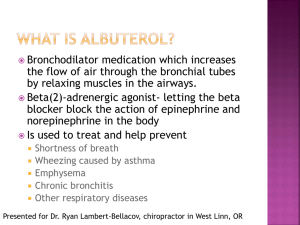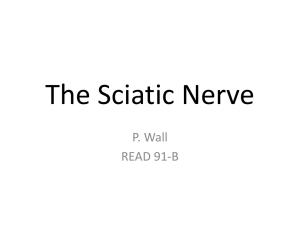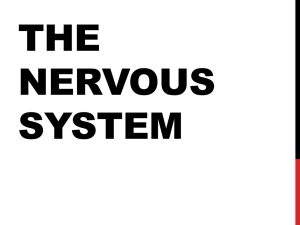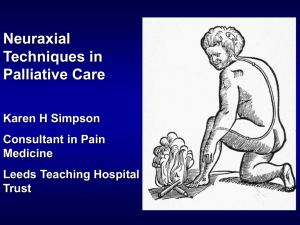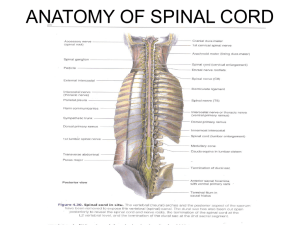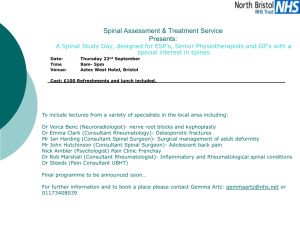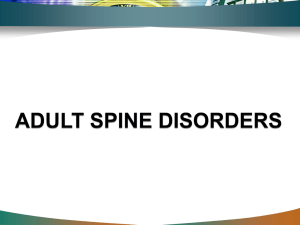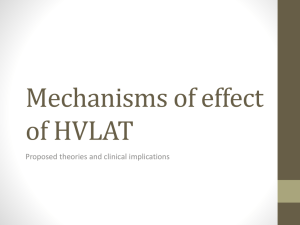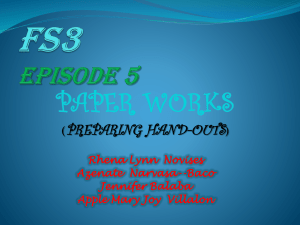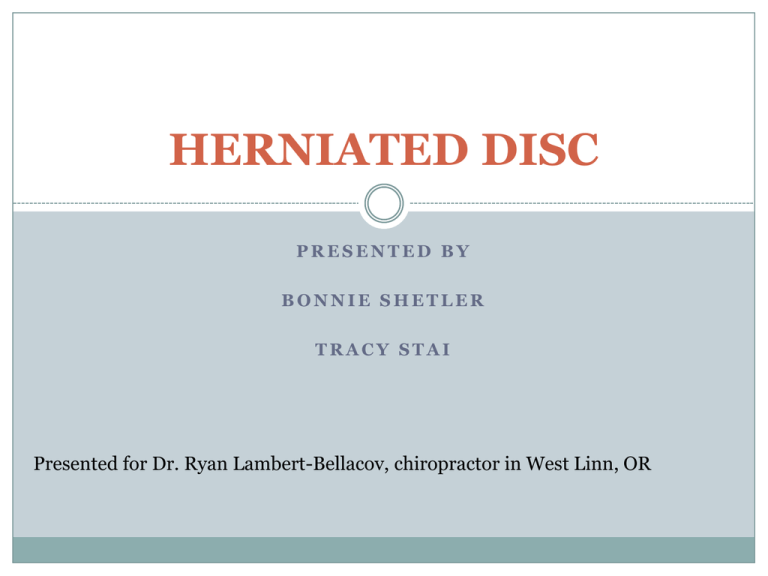
HERNIATED DISC
PRESENTED BY
BONNIE SHETLER
TRACY STAI
Presented for Dr. Ryan Lambert-Bellacov, chiropractor in West Linn, OR
Presented for Dr. Ryan Lambert-Bellacov, chiropractor in West Linn, OR
Cause
Disks are soft rubbery pads that are found between the
vertebrae. The spinal cord and other nerve roots are
located in the spinal canal. The disks are between the
vertebrae and act as shock absorbers and allow flexibility.
When a herniated or ruptured disk occurs, a portion of the
nucleus center pushes through the outer edge of the disk
and back toward the spinal canal where the nerves are
located. The nerves are very sensitive even to the slightest
pressure.
When we are young, disks have high water content and the
content lessens as we age. The disks become less flexible,
decrease in size and the space between the vertebrae
narrows.
Illustration copyright 2000 by Nucleus Communications, Inc. All rights
reserved. http://www.nucleusinc.com
Often a herniated disc by itself does not cause pain. Pain occurs when
the membrane on the outside of the spinal cord or spinal nerves is
irritated. Loss of function, such as weakness or altered sensation, can be
caused by pressure from the herniated disc on the nerve roots or spinal
cord. Pain or numbness may occur in the area of the body to which the
nerve travels
Presented for Dr. Ryan Lambert-Bellacov, chiropractor in West Linn, OR
Illustration copyright 2000 by Nucleus Communications, Inc. All rights
reserved. http://www.nucleusinc.com
The sciatic nerve is formed by the nerve roots coming out of the spinal cord
into the lower back (lumbar region). Branches of the sciatic nerve extend
through the buttocks and down the back of each leg to the ankle and foot.
A herniated disc may compress one or more of the nerve roots that form the
sciatic nerve. Pressure on one of these nerve roots will often produce
distinctive symptoms of sciatica, such as pain, numbness, weakness, and
tingling in the affected leg.
Although a herniated disc is the most common cause of sciatica, sciatica can
also be a symptom of other problems, such as narrowing of the spinal canal
(spinal stenosis), nerve root compression resulting from injury, and certain
Risk Factors
Age – Middle age is the most common age group
35 – 45, due to degenerative disks.
Weight – Cause more stress on the disks
Smoking – Decreases oxygen levels in your blood,
which deprives them of vital nutrients
Height – Men taller than 5’ 11” and women taller
than 5’ 7” have increased chances of a herniated
disk
Physically demanding jobs that require repetitive
movements or sitting or standing too long.
Presented for Dr. Ryan Lambert-Bellacov, chiropractor in West Linn, OR
Signs and Symptoms
Symptoms include pain, numbness or weakness in
neck chest, arms and hand. Sometimes there will
be pain in the legs. Also, muscle spasm or
cramping, sciatica. Sciatica is a symptom
frequently associated with a lumbar herniated disk.
Pressure on one or several nerves that contribute
to the sciatic nerve causing pain, burning, tingling
and numbness that extends from the buttock into
the leg and sometimes foot. Diagnosis is made by a
medical exam from a doctor, X-Rays, MRI or CT
Scan.
Treatment
Herniated disks are usually first treated with non-surgical treatments
including rest activities, physical therapy, medicines to relieve pain and
inflammation. A doctor will recommend surgery if there are nerves
being pinched or spinal pain.
Alternative treatments
Acupuncture
Acupressure
Massage
Non-Invasive Treatment
Chiropractic Care
Drugs – OTC
Acetaminophen (Tylenol)
NSAIDS (non-steroidal anti-inflammatory drugs (aspirin, ibuprofen,
naproxen)
Presented for Dr. Ryan Lambert-Bellacov, chiropractor in West Linn, OR
Treatment Continued
Prescription Medications
Prescription NSAIDs
Muscle relaxants (i.e.. Valium) alleviates spasms
Oral steroids – used to reduce swelling
Uploads Codeine, morphine – alleviates intense pain
Anti-depressants – block pain messages from being
received by your brain and increase the effects of
endorphins, which are your bodies natural pain relievers.
They also help you sleep better.
Spinal Injections – Epidural steroid
Injections contain corticosteroids which are potent antiinflammatory agents. May take a few days to work and no
more than three injections can be given in a year.
Presented for Dr. Ryan Lambert-Bellacov, chiropractor in West Linn, OR
Exercise
Exercise is an effective way to strengthen and stabilize low
back muscles, helps prevent further injury and pain. Being
at your ideal weight is important. Extra weight constantly
strains your back. Simple stretching and aerobic exercises
can effectively control pain. Stretching programs such as
yoga and pilates, moderate aerobic activities like waling,
bicycling, swimming. Start any new aerobic activity slow
and gradually increase.
Active Treatments
Improve flexibility, posture, strength, core stability and
joint movement.
Surgery
most common is discectomy which removes all or part of
the damaged disc.
Exercises for Herniated Disk
Peer Reviews
Mayo Clinic
www.mayoclinic.com
Spine Universe
www.spineuniverse.com
Presented for Dr. Ryan Lambert-Bellacov, chiropractor in West Linn, OR


